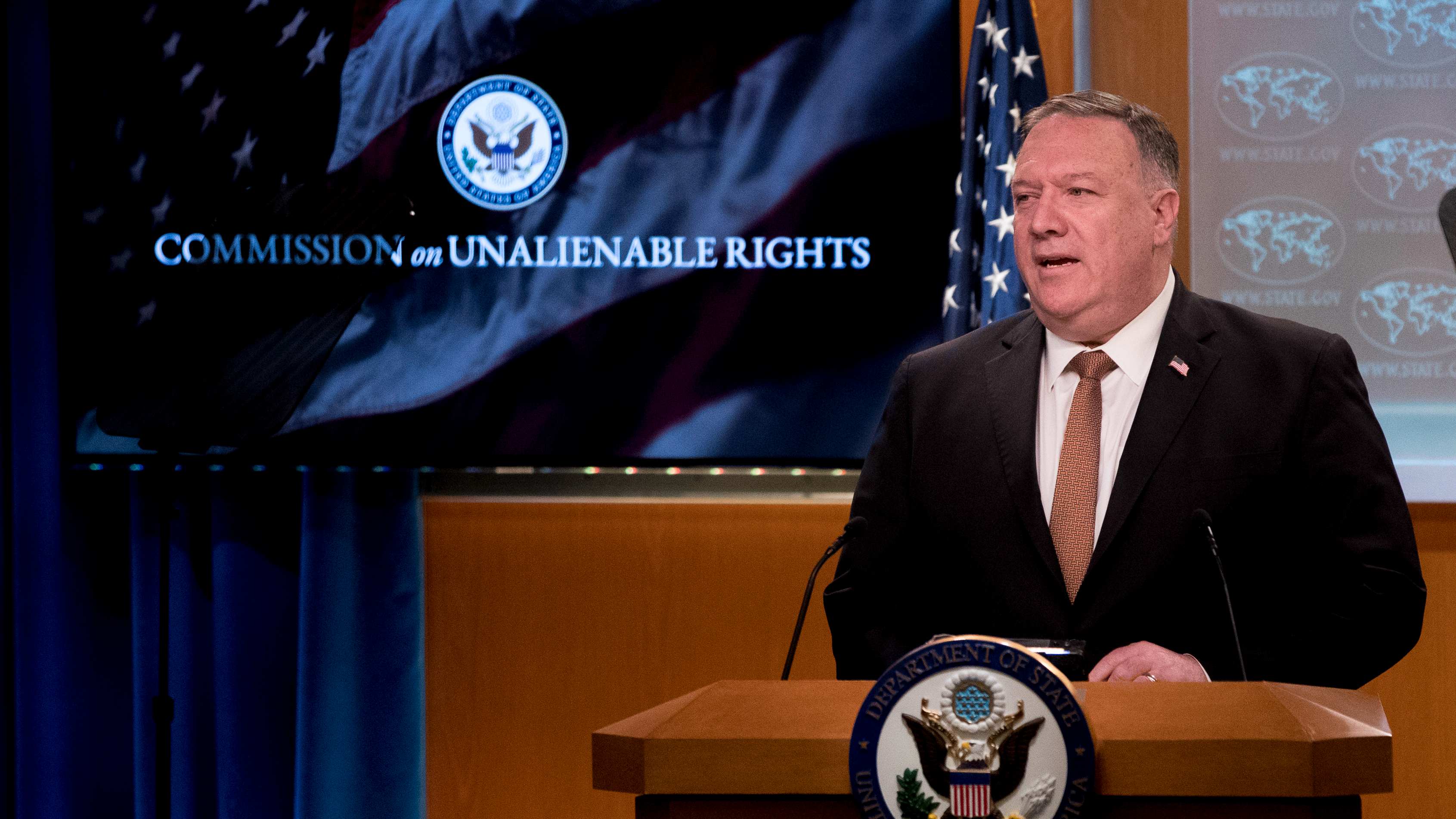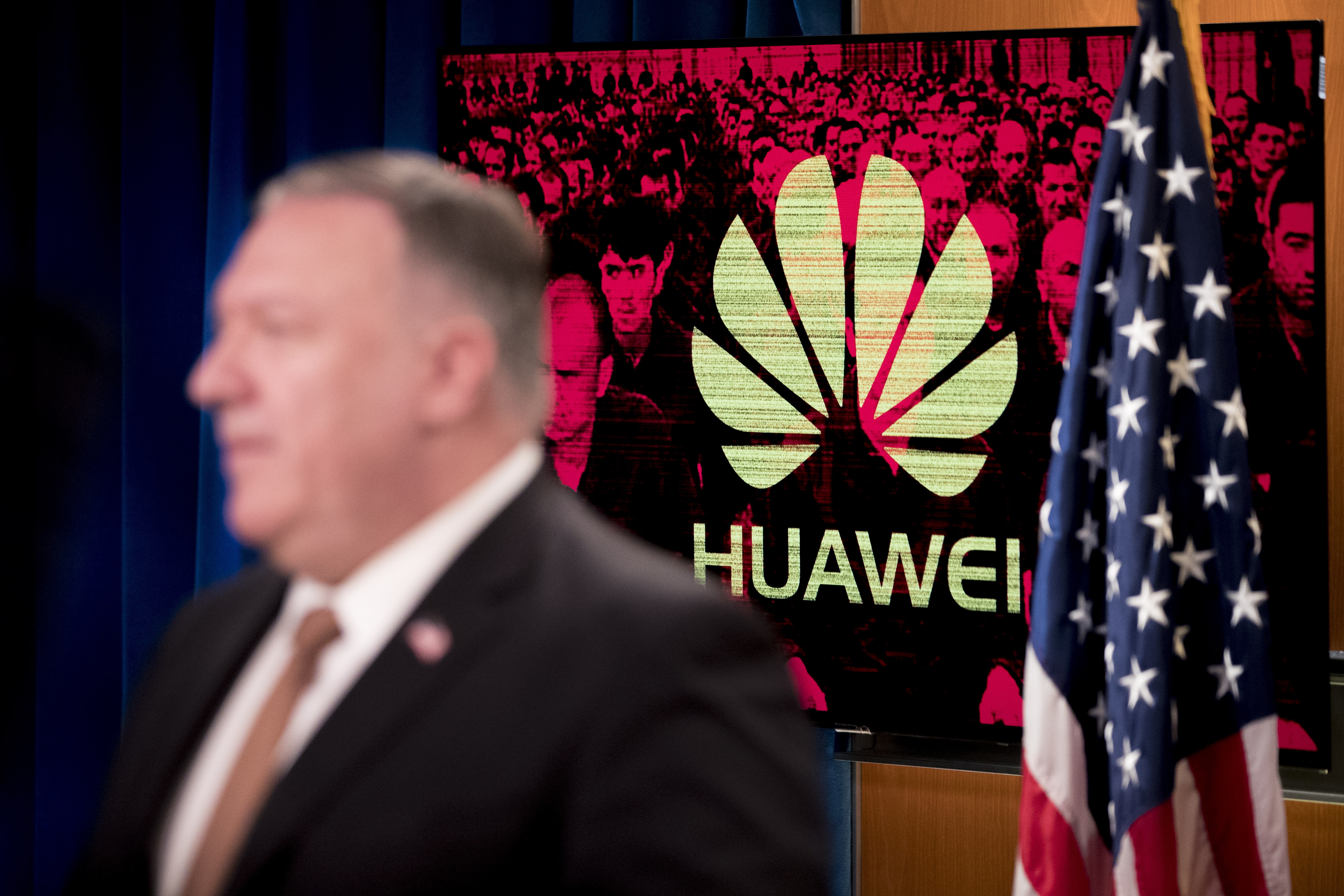
A monitor displays the words "Commission on Unalienable Rights" behind Secretary of State Mike Pompeo as he speaks during a news conference at the State Department in Washington, July 15, 2020. /AP
A monitor displays the words "Commission on Unalienable Rights" behind Secretary of State Mike Pompeo as he speaks during a news conference at the State Department in Washington, July 15, 2020. /AP
Editor's note: Tom Fowdy is a British political and international relations analyst and a graduate of Durham and Oxford universities. He writes on topics pertaining to China, the DPRK, Britain and the U.S. The article reflects the author's opinions, and not necessarily the views of CGTN.
Anti-China tirades by U.S. Secretary of State Mike Pompeo have become a daily thing now. There has not been a period of 24 hours for some time now when he has not attacked China by referring to the "Communist Party."
In doing so, on each occasion he deliberately moves to draw a distinction between the party and the country as a whole, assuming as if he speaks for the Chinese people more than its own government and is "on their side."
In today's briefings he stated what the CPC "does to the Chinese people is bad enough" whilst in others he has stated things like "we want the Chinese people to be successful," and comments such as "the Communist Party has an enormous credibility" problem. The single-handed stream of bad faith attacks is unprecedented for a man who is otherwise described as "America's top diplomat."
Pompeo has often used this sort of language against every country he has targeted, including Iran and Venezuela. Driven by extreme American exceptionalism, he believes that he represents the "true interests" of a country's population even as he strives to sanction, blackmail and coerce the given nation into following Washington's will. To invoke this kind of rhetoric against China is condescending and patronizing.
The people of the country do not see Pompeo as a savior, nor do they side with him against their government. Instead, he is frequently depicted in wholly negative terms by netizens and a target of growing resentment as he smears, slanders, and strives to crush the success of their country in the name of "American interests." Mike Pompeo doesn't speak for the Chinese people.
A fundamental change is taking place across Chinese society. Once having seen America as a country to admire and to look up to as a beacon of brilliance and success, many Chinese are now becoming dismayed and angry with the profound levels of hostility by which the United States is pushing against their country, which is seen as an explicit attempt to crush China's rise, circumvent its development, and politically subjugate it.
The reason why is not the binary question of "authoritarianism vs. democracy" as Pompeo erroneously assumes it to be, which leads him to misinterpret the outcome, but rather it is the metric of national identity in which the attacks by America have on public opinion, creating a "rallying around the flag" effect, even amongst many liberals.
Certain events in the past year have accelerated this effect. There were three clear turning points I observe in Chinese audiences over the past year, the assaults on Huawei, the weaponization of protests in Hong Kong, and the anti-China stigma pushed by Washington over the COVID-19.

A monitor displays the logo for "Huawei" behind Secretary of State Mike Pompeo as he speaks during a news conference at the State Department in Washington, July 15, 2020. /AP
A monitor displays the logo for "Huawei" behind Secretary of State Mike Pompeo as he speaks during a news conference at the State Department in Washington, July 15, 2020. /AP
This does not generate good sentiment, and it is not seen as an "issue with the Communist Party" but in fact outright assaults on national pride and esteem as a whole. It's not interpreted in ideological terms, rather such moves invoke memories of the century of humiliation and colonial trauma, and the perception America is striving to do so again.
As set out above, these have all strongly communicated the message that Washington is acting in obvious bad faith and against the interests of the country as a whole. This perception does not change even if given people are critical of their own government on certain things. They will support China before they support a foreign adversary.
As a result, this not surprisingly means that rhetoric from Pompeo such as "we want the Chinese people to be successful" does not resonate with the public, because the population looks at how companies are being blacklisted and being forced out of certain markets by the U.S., how visa bans are being proposed for potentially hundreds of millions of people, how the country is being slandered on a daily basis by politicians and the media, how flashpoints such as the South China Sea are being weaponized against the country, how Pompeo has persistently told lies including conspiracy theories over the COVID-19's origin and more, how Chinese students are being targeted with hostility, suspicion and more.
The list goes on. One must wonder, how can he say he stands with the Chinese people with a straight face?
As a result, it is quite obvious to conclude that Mike Pompeo does not stand or speak for the people of China as a whole as opposed to "its government." The effect is the opposite; there is a clear growing resentment and bitterness within the country over the behavior of the United States and its attempt to block what they see as China's rightful rise. This is not seen as an assault on the CPC, but a siege on the country as a whole which invokes painful legacies.
The Secretary of State is increasingly perceived in bad faith and antagonistic terms. The end product is the public are more, not less likely, to get behind their country and rise to the challenge.
(If you want to contribute and have specific expertise, please contact us at opinions@cgtn.com.)